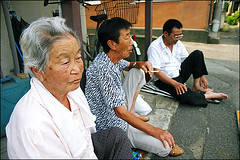Utoro

Oh My News International has a story by David McNeil and Andreas Hippin about a Korean village near Kyoto in Japan, said to be the last community of forced labourers and their descendents who were taken to Japan during the colonial period. It has long been threatened with demolition and clings to survival in the shadow of the bulldozers, in half-way-round-the-world echo of a Palestinian village on the West Bank. Only 230 residents remain, most of them in old age it seems.
The village of Utoro has clearly become something of a nationalist cause celebre in South Korea recently with solidarity movements and even fundraising concerts planned. One interesting aspect though, is that the attitude of the residents seems to lack the overt nationalism of their South Korean supporters. Their attitude is rather one of weary determination and pride in their 'solid' community. You can perhaps see the disconnect between residents and campaigners in this paragraph:
The renewed attention and the possibility that the Utoro plot will be bought by supporters and preserved as a memorial to conscripted Koreans, is welcomed by Gen but he is wary of being used for political purposes. "There are the people who want to continue living here and those who want to preserve the history. We are not especially interested in a museum, but some want to force Japan to pay for one as a way of acknowledging the past."
I might be reading too much into too little here, but I think this says something about the difficulties of imprinting the nationalist narrative onto every issue involving Korea and Japan and their shared history. This issue is also a universal issue, a human rights issue, a class issue. Obviously there is much that has yet to be dealt with in the history of Japanese colonialism, and the racism that it produced (towards Koreans and others) is still an important component of Japanese society. But to my mind, posing an issue like this solely, or even largely in the context of Korean nationalism as the South Korean NGOs seem to do, must act to shut off possibilities for solidarity with Japanese social movements and class-based alliances of Koreans and Japanese.



2 Comments:
Interesting post. Have you checked out Sonia Ryang's work? She writes some interesting things about the issue of (Zanichi?) Koreans in Japan.
From her site her work on zainichi Koreans (same as chaeil/재일) looks very interesting. Actually this is a topic I know very little about, but I've heard a few presentations recently on the topic at various conferences. The angle I'm particularly interested in the the reality or possibility of solidarity between Japanese and Korean social movements.
Post a Comment
<< Home